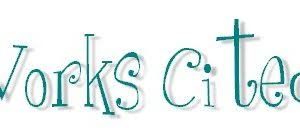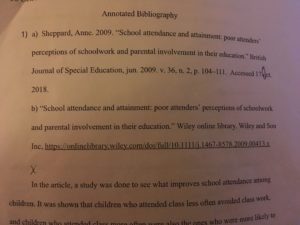
Annotated Bibliography
- – Sheppard, Anne. 2009. “School attendance and attainment: poor attenders’ perceptions of schoolwork and parental involvement in their education.” British Journal of Special Education, jun. 2009. v. 36, n. 2, p. 104–111. Accessed 17 Oct. 2018
– “School attendance and attainment: poor attenders’ perceptions of schoolwork and parental involvement in their education.” Wiley online library. Wiley and Son Inc, https://onlinelibrary.wiley.com/doi/full/10.1111/j.1467-8578.2009.00413.x
In the article, a study was done to see what improves school attendance among children. It was shown that children who attended class less often avoided class work, and children who attended class more often were also the ones who were more likely to do their homework. It was concluded in the study that students who had parents involved took their school work seriously.
This article supports my counter argument that parental involvement is crucial to the essay all academic success of students.
2. Baker, Eva. “The Importance of After school Programs in Education Reform Worldwide: Making it Essential in America.” Accessed 19 Oct. 2018 https://www.expandinglearning.org/expandingminds/article/importance-afterschool-programs-education-reform-worldwide-making-it.
After school programs that are good ones help students with homework, engage students in their community, keep children safe, provide intellectual, and social enrichment, and more. The problem is that the government doesn’t compensate staff and teachers well, and After school programs sometimes aren’t funded enough.
I will be observing after schools, and how they involve parents, and this article gives me enough background about after schools. This will help me determine the extent of how After schools can fully incorporate parents in the academic lives of children based on how much support and help they get from the government.
3. Campbell-Hicks, Ruth. 2016. “Early literacy programmes in public libraries: best practice.” The Australian Library Journal, 65:2, 121-129, DOI: 10.1080/00049670.2016.1121770. Accessed 19 Oct. 2018 https://www.tandfonline.com/doi/full/10.1080/00049670.2016.1121770.
Children who are behind in early literacy skills struggle to catch up throughout their schooling, and into their adult lives. Libraries help children grow when it comes to reading, and helps them love reading. Libraries involve families, and the communities by giving them access to programs. Libraries involve parents and caregivers by encouraging them to talk, play, read more, and do everything in their power to help their children grow academics in their early stages. Parents and families can not teach their children alone since the help of library programs, and services aid them significantly.
This reading explains how libraries involve parents, and families in their children’s academic lives, and what they offered that is beneficial to families and their children.
4. Garcia, Lily E., and Otha Thornton. 2014. “The Enduring Importance of Parental Involvement.” NeaToday, Accessed 19 Oct 2018. http://neatoday.org/2014/11/18/the-enduring-importance-of-parental-involvement-2/.
Involving the public, and parents in the educational lives of children is crucial. It has been researched that family engagement in schools help students succeed. Students with involved families score higher on tests, earn better grades, and behave well. Schools helps parents make sure their students are on track, by giving them the opportunity to keep in touch with their children’s teachers, and making a difference in their child’s school. Parents can also makes sure that the federal government gives their children all the resources they need to get the top education possible.
This reading shows the ways schools involve parents or families, and the reason why they might want to involve parents or families.
5. Pattillo, Mary. 2015. “Everyday Politics of School Choice in the Black Community.” Du Bois Review 12(1): 41-71 Accessed 17 Oct. 2018.
https://www.cambridge.org/core/services/aop-cambridge-core/content/view/S1742058X15000016
Pattillo examines whether school choice strengthens the control families have in deciding where their child goes to school. Rather than being assigned a school by their district, families can select public schools for children. Parents are given control over their children’s education because they are given the chance to pick schools that are higher performing schools that better their children’s education as opposed to bringing their children to lower performing schools.
This article supports my research because it shows how parents are involved in the lives of their children, and in what ways they are involved, and what is the outcome of their involvement, and therefore supports my counter argument.
Supporting Documents


What I learned
- I had to use the school’s database, and credible sources on google (google scholar) to research for appropriate sources to back up my claim.
- Most credible sources ended with .org,.gov, etc.
- I had to learn how to effectively cite my sources in ASA format.
- Summarizing what I read in my annotated bibliography would be beneficial to me later when I had to come back and write about the source or use it in my essay.


